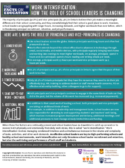Work Intensification: How the Role of School Leaders is Changing
School leaders are grappling with longer hours, increasing demands, and higher workloads than ever before.
Download, print, and share this fact sheet! (7.43 MB / pdf)
DownloadThe majority of principals (91.8%) and vice-principals (83.4%) in Ontario believe their job makes a meaningful difference in their school community, and they overwhelmingly find their school a good place to work. However, school leaders are grappling with longer hours, increasing demands, and higher workloads than ever before, which is threatening principal recruitment, retention, and job performance.
Here are 5 ways the role of principals and vice-principals is changing
1. Longer hours:
- Like school leaders across the globe, Ontario principals work long hours and often feel pressured to do so.
- Work often extends beyond the school office due to advances in technology through email, social media, and mobile devices, with principals regularly bringing work home and working late evenings to meet higher workloads. On average, principals spend 11 hours and vice-principals spend 9 hours reading and writing emails per week.
- On average, principals work 59 hours per week and vice-principals work 54.5 hours per week.
2. Work pace increasing:
- 60.3% of principals and 44.4% of vice-principals in Ontario agree that the pace of their work is too fast.
3. Fewer resources:
- Only 38.3% of Ontario principals feel they have the resources they need to do their job effectively (e.g. HR, training to address student or staff mental health concerns, PD on effective relationship building, other colleagues to go to for support).
4. Same day-to-day work– only more:
- Both principals and vice-principals continue to engage in the same kinds of tasks as they did in the past, but the volume of this work has increased (e.g. increased paperwork).
5. Additional work:
- In addition to their usual work of leading a school, both principals and vice-principals are taking on additional kinds of work.
- For example, in addition to leadership and management tasks, school leaders are now also responsible for attending to and supporting students’ and teachers’ well-being, which involves increased program development and delivery, additional meetings, and additional pressures to best manage already limited time and funding.
When these five factors are continually present and school leaders have no downtime to catch up on work or to recover both physically and emotionally from daily work stress, this is called “work intensification.” Work intensification involves managing condensed timelines and a simultaneous increase in the volume and complexity of tasks, activities, and other work demands. As effective school leaders are key to high-performing schools and healthy school environments, work intensification not only threatens school leader recruitment and retention, but also the well-being and performance of both staff and students.
Additional Resource Information
Pollock, K. (with Wang, F. & Hauseman, D. C.). (2017). The changing nature of vice-principals’ work: Final report. Retrieved from: http://www.edu.uwo.ca/faculty-profiles/docs/other/pollock/pollock-opc-vp-report-final.pdf
Pollock, K. (with Hauseman, D. C.). (2015). Principals’ work in contemporary times: Final report. Retrieved from: https://www.edu.uwo.ca/faculty-profiles/docs/other/pollock/OME-Report-Principals-Work-Contemporary-Times.pdf
Pollock, K. (with Wang, F. & Hauseman, D. C.). (2014). The changing nature of principals’ work: Final report. Retrieved from: https://www.edu.uwo.ca/faculty-profiles/docs/other/pollock/OPC-Principals-Work-Report.pdf
Pollock, K., & Wang, F. (2019, March). Le travail des directions d’école au sein des systèmes d’éducation de langue française en Ontario. Récupéré de: https://www.edu.uwo.ca/faculty-profiles/docs/other/pollock/pollock-ADFO-Report-Revised-Final.pdf
Pollock, K., & Wang, F. (2019 March). Principals’ work in Ontario’s French-language education systems. Retrieved from: https://www.edu.uwo.ca/faculty-profiles/docs/other/pollock/pollock-ADFO-EnglishReport-Final-V10.pdf
References
Alberta Teachers’ Association [ATA]. (2014). The future of the principalship in Canada. Retrieved from: https://www.teachers.ab.ca/SiteCollectionDocuments/ATA/Publications/Research/The%20Future
%20of%20the%20Principalship%20in%20Canada.pdf
Alberta Teachers’ Association [ATA]. (2017a). The Canadian school leader: Global forces and future prospects. Retrieved from:https://www.teachers.ab.ca/SiteCollectionDocuments/ATA/Publications/Research/COOR-101-13%20Canadian%20School%20Leader.pdf
Alberta Teachers’ Association [ATA]. (2017b). A national study on the impact of electronic communication on Canadian school leaders. Retrieved from: https://www.teachers.ab.ca/SiteCollectionDocuments/ATA/Publications/Research/COOR-104%20A%20National%20Study%20of%20the%20Impact%20of%20Electronic%20Communication%
20on%20Canadian%20School%20Leaders.pdf
Lim, L., & Pollock, K. (2018). Secondary principal perspectives: How work intensification impacts their vice-principals. OPC Register, 20(3) 22–26.
Ontario Principals’ Council. (2017). International Symposium White Paper: Principal work–life balance and well-being matters. Retrieved from: https://www.edu.uwo.ca/faculty-profiles/docs/other/pollock/PrincipalWellBeing-17-FINAL-with-Acknowledgement-1.pdf
Pollock, K. (2017, September). Healthy principals, healthy schools: Supporting principals’ well-being. EdCan Magazine. Retrieved from: https://www.edcan.ca/articles/healthy-principals-healthy-schools/
Pollock, K., Wang, F., & Hauseman, C. (2017). Vice-principals’ work: More than being an instructional leader. OPC Register, 19(3), 20–24.
Pollock, K., & Hauseman, D. C. (2018). The use of e-mail and principals’ work: A double-edged sword. Leadership and Policy in Schools, 1–12 .
Pollock, K. (2016). Principals’ work in Ontario, Canada: Changing demographics, advancements in informational communication technology and health and well-being. Journal of the Commonwealth Council for Educational Administration & Management, 44(3), 55–74.
Riley, P. (2016). The Australian principal occupational health, safety and wellbeing survey. Strathfield, Australia: Institute for Positive Psychology & Education. Retrieved from: http://www.principalhealth.org/au/2016_Report_AU_FINAL.pdf
Wang, F., Pollock, K., & Hauseman, C. (2018). School principals’ job satisfaction: The effects of work intensification. Canadian Journal of Educational Administration and Policy, 185, 73–90.
Photo: Adobe Stock

